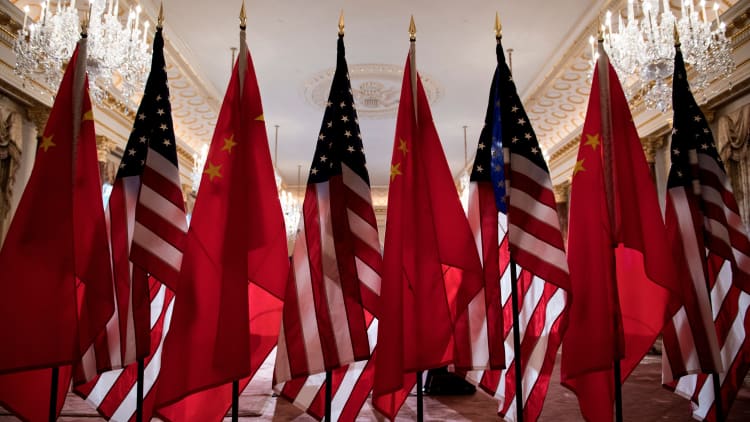The United States and China have been here before.
After threatening to impose potentially devastating tariffs, President Donald Trump pulled back in the wake of talks with Chinese President Xi Jinping at the G-20 summit in Japan on Saturday.
Trump and Xi, who both tout their strong personal relationship, reached a similar agreement at the previous G-20 summit in Argentina at the end of the last year.
But those talks ultimately failed and tariffs today are much higher than they were even as recently as early May.
And if history is any guide to the future, the gentlemen's agreement struck between the leaders of the world's two largest economies over the weekend in Osaka offers no clear path to rolling back tariffs and ending a trade war that threatens to tip the global economy into recession.
"It's a temporary timeout," Peter Boockvar, chief investment officer at Bleakley Advisory Group, told CNBC. "I don't see any path to a deal and we're stuck with 25% tariffs on $250 billion of goods."
Boockvar isn't alone. The Eurasia Group, for its part, sees only a 45% chance that a trade deal gets done this year.
And Trump is no rush. The president said as much after departing the G-20 summit and made clear that the tariffs currently in place are unlikely to be reduced any time soon.
In a Fox Business News interview before the G-20, the president said he was "very happy with where we are now," claiming that the U.S. is "taking in a fortune, and frankly [it's] not a very good thing for China, but it is a good thing for us. "
The business community by and large disagrees.
More than 600 U.S. companies, including Target and Walmart, had urged Trump not to impose additional tariffs, warning that such a move could cost 2 million American jobs.
And while business groups Saturday welcomed the renewed talks, they made clear they're still anxiously waiting for a final deal. According to Boockvar, there's little reason to celebrate.
"If I'm a CEO, waiting on how this weekend was going to go, do I feel any better? If I'm in manufacturing, maybe I feel a touch better it's not worse in the short term, but I still have to deal with this 25% tariff and the threat of more tariffs hanging over," he said.

Intellectual property still a big sticking point
The problem is that China sees little reason to give in to U.S. demands to change is domestic laws in order to increase intellectual property protections for foreign, particularly American, companies.
It's a key sticking point for the Trump administration. The president's decision in May to hike tariffs to 25% on $200 billion in Chinese goods came after Beijing allegedly back tracked on key commitments under a draft deal, including intellectual property protection.
Indeed, China's Vice Premier Liu He has only reiterated Beijing's position that a deal must be balanced and "expressed in terms that are acceptable to the Chinese people and do not undermine the sovereignty and dignity of the country."
According to Boockvar, asking China to make changes to its domestic law would be like Beijing asking the U.S. to make constitutional changes to meet its economic demands.
"The U.S. is gonna have to accept that China is not going to put IP protection into law," Boockvar said.
But the Trump administration doesn't appear ready to give in on that point. U.S. Trade Representative Robert Lighthizer has rejected China's calls for a balanced deal, citing intellectual property as the reason.
That leaves the market largely where it was when Trump accused China of breaking its commitments in May, Boockvar said. The only difference is that the Fed is going to cut rates, he added, which wasn't a possibility at that time.
"No substantive progress was announced on the main issues in the dispute," Goldman Sachs made clear in a note published on Saturday.
U.S. election looms for Trump — and China
While a deal may or may not materialize this year, Trump at least has an incentive to hold off on increasing tariffs until after the 2020 presidential election.
Trump needs the economy to perform well and another tariff hike could be "quite disruptive to the U.S. economy," according to Ed Yardeni, president of Yardeni Research.
"There is no point in escalating the trade war now and creating problems in the economy and losing the election, in which case China will be able to negotiate with a completely different president come 2021," Yardeni said.
And Beijing has its own incentives to wait out the U.S. presidential election. If they keep the negotiations going until the elections then they'll know if they have to deal with Trump or someone else, Yardeni added.
Still, Goldman Sachs' "base case remains a 10% tariff rate on the remaining $300 billion of Chinese imports, lower than the 25% rate that has been proposed by the USTR," the bank said in a note before the G-20 summit.
Goldman made clear that even if the U.S. and China commit to negotiations and back off tariff hikes for now, which they did, "there could still be additional tariffs later this year." The bank reiterated that stance in a note on Saturday.
And according to Boockvar, if Trump decides to make good on his threat and impose tariffs on China's remaining $300 billion in exports to the United States, the impact could be devastating.
"You can guarantee a global recession," he said.


